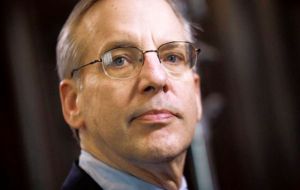MercoPress. South Atlantic News Agency
US Federal Reserve reiterates concern with stubbornly slow rate of inflation
 William Dudley, president of the Federal Reserve Bank of New York said in a television interview that a September rate hike is “possible.”
William Dudley, president of the Federal Reserve Bank of New York said in a television interview that a September rate hike is “possible.” United States Federal Reserve officials believed last month that near-term risks to the U.S. economy had subsided and that an interest rate increase could soon be warranted. But they did not indicate when they would likely raise rates.
The minutes of July 26-27 meeting show that officials were encouraged by a rebound in job growth. They also took note of a stabilization of financial markets after a bout of turbulence triggered by Britain’s June 23 vote to leave the European Union.
The Fed officials believed those developments had lessened the risks for the economy in the short run. The minutes show that as a result, the officials thought a rate hike “was or would soon be warranted.”
But a key factor holding the Fed officials back was the stubbornly slow rate of inflation, which has been running below the central bank’s 2% target for more than four years, according to the minutes.
The minutes released Wednesday closely parallel the message the Fed sent in a statement it released after its July meeting.
In that statement, the Fed noted the job market had rebounded from a brief slump. Still, it said it planned to monitor global economic threats and financial developments to ensure that they don’t slow the economy.
This week, William Dudley, president of the Federal Reserve Bank of New York and a close ally of Fed Chair Janet Yellen, said in a television interview that a September rate hike is “possible.” Dudley said he thought that solid job growth would continue and that the sluggish pace of the U.S. economy would pick up.
But, as the Fed itself has done repeatedly, Dudley stressed that any policy action would depend on the health of the most recent economic data.
Though some economists say they think the Fed will be ready to raise rates next month, most have said they think the policymakers will take no action before December.
The Fed’s July decision to leave rates alone was backed by a 9-1 vote.
In December last year, the Fed raised its benchmark lending rate from a record low near zero, where it had stood since the depths of the 2008 financial crisis. But in recent months, turbulence in financial markets and concerns about China and weakening global growth have persuaded the Fed to keep rates on hold.




Top Comments
Disclaimer & comment rulesCommenting for this story is now closed.
If you have a Facebook account, become a fan and comment on our Facebook Page!